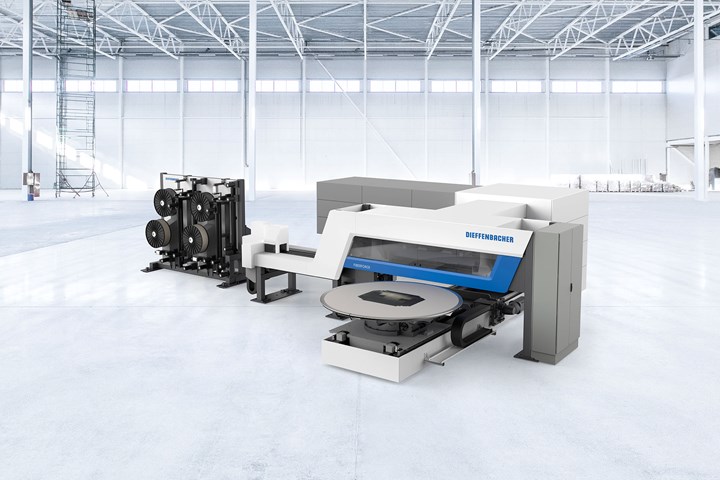Intelligent mobility concepts support e-mobility
CAMX 2023: Materials, process and automation solutions from Dieffenbacher enable Industry 4.0, high output, optimized quality and reproducible composites manufacturing.
Dieffenbacher (Eppingen, Germany and Windsor, Ont., Canada) is presenting intelligent plant concepts for producing composite components for e-mobility.
The company is highlighting its efficient and sustainable production solutions for components such as battery housings, battery boxes, underbody covers and protection sheets. These solutions feature technologies ranging from sheet molding compound (SMC) to direct long fiber thermoplastics/glass mat thermoplastics (D-LFT/GMT) to wet molding (LCM), all calling attention to the hydraulic press as the core element of the production process. The press itself further complements Dieffenbacher’s new digital platform, Evoris.
In a session titled “Replacing Metal With Continuous Fiber-Reinforced Thermoplastics,” Dieffenbacher is sharing a case study for an automotive product in which a multicomponent metal subassembly is replaced with a single continuous fiber-reinforced thermoplastic structure. The production process, using a state-of-the-art Dieffenbacher Fiberforge tape laying system and Fibercon tailored blank consolidation system, will be described in detail.
The Dieffenbacher Fiberforge is claimed to be the fastest tape laying system in the world. It produces near-net-shape laminates from continuous fiber-reinforced tapes that can be used to manufacture structural composite components or to provide local reinforcement. This provides components with optimal material properties regarding deflection behavior, strength and impact resistance.
The Fiberforge’s nesting method helps facility operators use valuable raw materials as efficiently as possible. The system can cut undirectional (UD) tapes at any angle between -45° and 45° to produce a contour with minimum waste, Dieffenbacher says. In one sample application, waste was reduced from 50% to 6.7% compared to using organosheets.
Evoris has enabled the company to develop a new approach for digitalizing hydraulic press systems and complete plants that takes advantage of artificial intelligence and self-learning capabilities. With apps for condition monitoring and process analysis, operators gain transparency throughout the entire facility and can make important decisions more quickly to improve processes, enhance machine availability and optimize maintenance. The results are increased production capacity and higher quality components.
“High output, superior quality and reproducible manufacturing processes are the core requirements for e-mobility,” explains Marco Hahn, director sales of the Forming Business Unit at Dieffenbacher. “We do not stop there. Our systems are also characterized by a consistent and uniform control concept for all line participants, cycle time optimization, maximum reliability, a visualization system and smart digitalization solutions.”
Related Content
-
SAM XL demonstrates closed-loop digital methodologies via full-size aerocomposite parts development
PeneloPe Project’s modular, zero-defect manufacturing deliverables are being highlighted in an upcoming video that demonstrates the resulting aerospace pilot line’s feasibility.
-
Com&Sens presents workshop on fiber optic sensing for COPVs
Three-day hands-on workshop from June 11-13 in Leuven, Belgium, will equip participants with a better understanding of fiber optic sensing technology for digital manufacturing of composite tanks.
-
How AI is improving composites operations and factory sustainability
Workforce pain points and various logistical challenges are putting operations resilience and flexibility to the test, but Industry 4.0 advancements could be the key to composites manufacturers’ transformation.
















